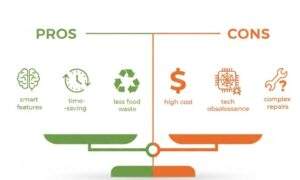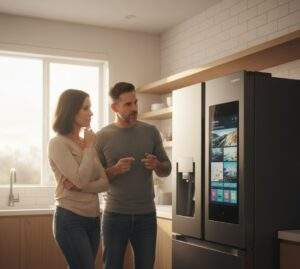Smart Refrigerator Worth: Unpacking the Hype vs. Reality
You’re standing in the appliance aisle, staring at a refrigerator with a giant touchscreen that can stream music, display your family’s calendar, and even show you what’s inside without opening the door. It looks impressive, but the price tag is staggering. This immediately brings up the crucial question every pragmatic homeowner is asking in 2025: is a smart refrigerator worth it? The marketing promises a seamless, futuristic kitchen, but you’re rightfully skeptical. Are these features game-changing conveniences or just expensive gimmicks you’ll stop using after the first month?

This guide is designed to cut through the noise. We’re not here to sell you on the flashiest features. Instead, we’ll provide a clear, analytical framework to help you decide if this major investment makes sense for your specific lifestyle. We’ll break down what today’s smart fridges can actually do, weigh the pros and cons, and analyze who truly benefits from this technology.
First, What Can a Smart Fridge Actually Do in 2025?
Before we can judge their value, we need to understand the current landscape of features. The answer to “what can a smart fridge do” has evolved significantly. In 2025, we’re seeing technology that moves beyond simple novelty.
- AI-Powered Food Recognition: Advanced internal cameras, like Samsung’s “AI Vision Inside,” can now identify dozens of common food items as you put them in or take them out. The fridge automatically logs your inventory and can even suggest recipes based on what you have.
- Automated Shopping Lists & Meal Planning: The fridge syncs with your smartphone, so when you’re low on milk, it’s automatically added to a shared grocery list. Some models integrate with meal planning apps, making grocery shopping remarkably efficient.
- Large Interactive Touchscreens: These act as a central family command center. You can leave digital notes, share calendars and photos, stream music from Spotify, mirror your TV, or look up recipes directly on the fridge door.
- “See Inside” Remote Viewing: Internal cameras let you check your fridge’s contents from the grocery store aisle on your phone, preventing you from buying something you already have.
- Advanced Climate Control: Many models offer customizable temperature and humidity zones (like a “FlexZone”) that can be changed from crisper drawer to soft-freeze, preserving specific foods better than a standard fridge.
- Smart Home Integration: Your fridge can become a hub for your other smart devices. Use voice commands via Bixby or Alexa to control lights, check your doorbell camera, or preheat your smart oven, all from the kitchen.
- Enhanced Maintenance & Diagnostics: The fridge can notify you on your phone if the door is left open, if the water filter needs replacing, or if it detects a potential performance issue.
Smart Refrigerator Pros and Cons
Every major purchase is a trade-off. Here’s a balanced look at the arguments for and against investing in a smart refrigerator.
The Pros: Where Smart Fridges Shine
- Reduced Food Waste: This is arguably the most practical benefit. By tracking inventory and expiration dates, AI features can prompt you to use ingredients before they spoil. The ability to check your fridge from the store directly combats overbuying.
- Unmatched Convenience: For busy families, the shared digital calendar, automated shopping lists, and on-screen recipe guides can genuinely streamline daily chaos. It centralizes planning in the heart of the home.
- Improved Organization & Meal Planning: Knowing exactly what you have on hand at all times makes meal planning less of a chore. Recipe suggestions based on your inventory can spark creativity and simplify the “what’s for dinner?” dilemma.
- Energy Efficiency (Sometimes): While the screen uses power, features like LG’s InstaView (letting you see inside without opening the door) and precise temperature management can reduce energy loss from door-open time. Overall, the energy efficiency of smart refrigerators is often comparable to new, high-end conventional models, as they must all meet modern ENERGY STAR standards.
The Cons: The Reality Check
- The Significant Cost Premium: A flagship smart refrigerator can cost $1,500 to $3,000 more than a comparable non-smart model from the same brand. You have to be certain you will use the features to justify this upfront cost.
- Technology Longevity & Obsolescence: The refrigeration unit might last 10-15 years, but will the tablet on the door receive software updates for that long? There’s a real risk of being stuck with an expensive, unsupported, and slow “smart” screen in 5-7 years.
- Repair Complexity and Cost: When a standard fridge breaks, you call an appliance repair person. When a smart fridge’s software glitches or its screen fails, you may need a specialized (and more expensive) technician.
- Privacy Concerns: Like any connected device, a smart refrigerator collects data. It’s essential to understand the manufacturer’s privacy policy and be comfortable with the information being gathered.
Clash of the Titans: Samsung Family Hub vs. LG InstaView
To understand the market, it helps to look at the two dominant players. The Samsung Family Hub vs. LG InstaView debate highlights two different philosophies.
- Samsung Family Hub: This is the “command center” approach. Samsung bets everything on its massive, feature-rich touchscreen. It’s designed for the hyper-connected family that wants to manage their entire digital life—calendars, music, photos, smart home controls—from the kitchen. The AI food recognition is its killer app for practicality.
- LG InstaView Door-in-Door: LG’s approach is more focused on practical convenience and energy savings. The signature feature is the glass panel that illuminates with two knocks, letting you see inside without opening the door. While it integrates with the LG ThinQ app for smart diagnostics and temperature control, its “smartness” is less screen-focused and more about subtle, efficient enhancements to the core function of a refrigerator.
Your preference between these two often reveals what you truly value: an all-in-one smart home hub (Samsung) or a more refined, energy-conscious appliance (LG).
The Verdict: Is a Smart Fridge Worth It for You?
This is where we answer the core question: is a smart refrigerator worth it for your specific household? Let’s break it down by persona.
For the Busy, Tech-Savvy Family
If your household juggles multiple schedules, school activities, and constant “who needs what?” coordination, a smart fridge can be a legitimate organizational tool. The ability to sync everyone’s calendars on a central display, leave notes for the kids, and have a shopping list that anyone can add to from their phone isn’t a gimmick—it’s a solution. The internal cameras are a lifesaver for last-minute grocery runs.
- Verdict: A game-changer. The premium price is offset by genuine time savings and a reduction in daily mental clutter.
- Recommendation: A model with a large interactive screen like the Samsung Family Hub is a strong contender. Its focus on family coordination and smart home integration aligns perfectly with this lifestyle.
For the Passionate Home Cook
You love experimenting with new recipes, value fresh ingredients, and treat your kitchen as your workshop. For you, features like on-screen recipe guides that can send cooking instructions directly to your smart oven are a huge plus. The precise, customizable temperature zones are not a novelty; they are essential for properly storing delicate produce, dry-aging steak, or rapidly chilling wine. AI inventory management helps you track specialty ingredients and plan more ambitious meals.
- Verdict: A powerful culinary assistant. The value comes from features that enhance the cooking process and preserve food quality.
- Recommendation: Look for models with advanced, multi-zone temperature controls (like Bosch’s FarmFresh System or Samsung’s FlexZone) and robust recipe app integration.
For the Skeptical, Budget-Conscious Buyer
You need a reliable, efficient refrigerator and you see the smart features as a potential point of failure. You believe your phone already handles calendars and shopping lists perfectly well. The idea of spending an extra $2,000 for a screen on an appliance that should last over a decade seems unwise, especially when that tech could be obsolete in five years.
- Verdict: Likely overkill. The marginal benefits do not justify the substantial cost and potential long-term risks.
- Recommendation: Invest the savings in a top-of-the-line conventional refrigerator from a highly-rated brand. You’ll get superior build quality and reliability without paying for features you won’t use.
Long-Term Value and Which Brands to Trust
When considering a decade-long investment, reliability is key. The most reliable smart refrigerator brand is often one that has a proven track record in traditional appliances first. Brands like LG, Samsung, GE, and Bosch consistently perform well in both reliability surveys and tech innovation.
However, the “smart” component adds a new layer. Before buying, research the brand’s software update policy. How long do they commit to supporting the onboard tablet? Look at reviews that are a few years old to see how the software performance has held up over time. Often, the best choice is a brand that excels at the core refrigeration technology, with the smart features serving as a well-executed bonus.
Conclusion
So, after all this analysis, is a smart refrigerator worth it? The only honest answer is: it depends entirely on you. It’s not a simple yes or no. For a busy, tech-forward family or a passionate cook, the integrated features can offer tangible value that streamlines life and enhances a hobby. For the budget-conscious buyer who values simplicity and long-term reliability above all, it remains a luxury that is hard to justify.
Before you make your final decision, ask yourself these questions:
- Will I genuinely use the command center features, or will my phone remain my primary tool?
- Does my family have the organizational challenges that a shared digital hub would actually solve?
- Am I willing to pay a significant premium for food management features that I could replicate with a free app and a little discipline?
- Is the risk of the “smart” technology becoming obsolete in 5-7 years worth the convenience it offers today?
Answering these honestly will give you a clearer path than any marketing brochure ever could. Choose the appliance that fits your reality, not just the one that promises a futuristic fantasy.
Frequently Asked Questions (FAQ)
-
Do smart refrigerators use a lot more energy than regular ones?
- Not necessarily. While the screen and computer use some electricity, smart refrigerators must meet the same federal ENERGY STAR efficiency standards as conventional ones. Features like door-in-door designs and better temperature management can sometimes offset the screen’s energy consumption. Always check the yellow EnergyGuide label for a specific model’s estimated yearly cost.
-
What is the most reliable brand for smart refrigerators in 2025?
- Reliability often comes down to the core mechanics. Brands like LG, GE, and Bosch have strong reputations for refrigeration technology. Samsung is a leader in smart features but has had mixed reliability ratings in some consumer reports over the years. It’s best to consult the latest reports from sources like Consumer Reports or Yale Appliance for up-to-the-minute data before buying.
-
How long do the screens and smart features typically last?
- The physical screen should last the lifetime of the appliance, but the software is the real concern. Like any tablet or computer, the onboard processor can feel slow after 3-5 years. The biggest risk is the manufacturer discontinuing software updates, which could leave you with security vulnerabilities or buggy, unsupported apps after 5-7 years.
-
Can a smart fridge really help reduce food waste?
- Yes, this is one of its most proven benefits. Features like internal cameras that let you check your stock from the store, AI-powered inventory tracking, and expiration date reminders directly address the primary causes of food waste: overbuying and forgetting what you have.
Hi, I’m [jeybee]. As a long-time resident of Seoul, I’m passionate about uncovering the authentic, everyday magic of Korea. This blog is my way of sharing my favorite spots, tips, and cultural insights with you, beyond the usual tourist traps.



